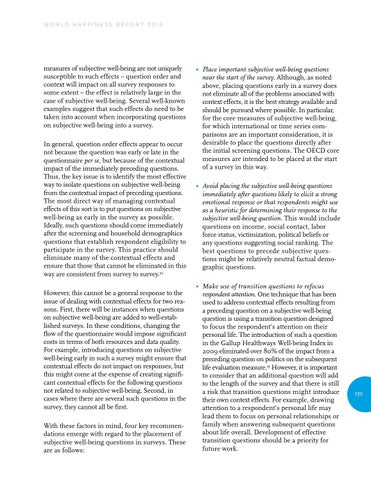World Happiness Report 2013
measures of subjective well-being are not uniquely susceptible to such effects – question order and context will impact on all survey responses to some extent – the effect is relatively large in the case of subjective well-being. Several well-known examples suggest that such effects do need to be taken into account when incorporating questions on subjective well-being into a survey. In general, question order effects appear to occur not because the question was early or late in the questionnaire per se, but because of the contextual impact of the immediately preceding questions. Thus, the key issue is to identify the most effective way to isolate questions on subjective well-being from the contextual impact of preceding questions. The most direct way of managing contextual effects of this sort is to put questions on subjective well-being as early in the survey as possible. Ideally, such questions should come immediately after the screening and household demographics questions that establish respondent eligibility to participate in the survey. This practice should eliminate many of the contextual effects and ensure that those that cannot be eliminated in this way are consistent from survey to survey.32 However, this cannot be a general response to the issue of dealing with contextual effects for two reasons. First, there will be instances when questions on subjective well-being are added to well-established surveys. In these conditions, changing the flow of the questionnaire would impose significant costs in terms of both resources and data quality. For example, introducing questions on subjective well-being early in such a survey might ensure that contextual effects do not impact on responses, but this might come at the expense of creating significant contextual effects for the following questions not related to subjective well-being. Second, in cases where there are several such questions in the survey, they cannot all be first. With these factors in mind, four key recommendations emerge with regard to the placement of subjective well-being questions in surveys. These are as follows:
• Place important subjective well-being questions
near the start of the survey. Although, as noted above, placing questions early in a survey does not eliminate all of the problems associated with context effects, it is the best strategy available and should be pursued where possible. In particular, for the core measures of subjective well-being, for which international or time series comparisons are an important consideration, it is desirable to place the questions directly after the initial screening questions. The OECD core measures are intended to be placed at the start of a survey in this way.
• Avoid placing the subjective well-being questions immediately after questions likely to elicit a strong emotional response or that respondents might use as a heuristic for determining their response to the subjective well-being question. This would include questions on income, social contact, labor force status, victimization, political beliefs or any questions suggesting social ranking. The best questions to precede subjective questions might be relatively neutral factual demographic questions.
• Make use of transition questions to refocus
respondent attention. One technique that has been used to address contextual effects resulting from a preceding question on a subjective well-being question is using a transition question designed to focus the respondent’s attention on their personal life. The introduction of such a question in the Gallup Healthways Well-being Index in 2009 eliminated over 80% of the impact from a preceding question on politics on the subsequent life evaluation measure.33 However, it is important to consider that an additional question will add to the length of the survey and that there is still a risk that transition questions might introduce their own context effects. For example, drawing attention to a respondent’s personal life may lead them to focus on personal relationships or family when answering subsequent questions about life overall. Development of effective transition questions should be a priority for future work.
125
